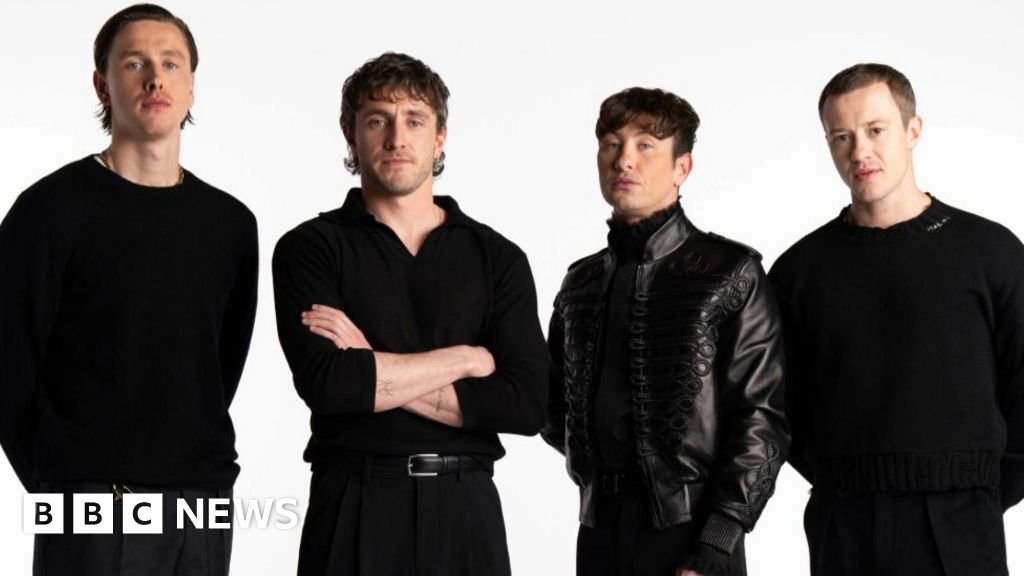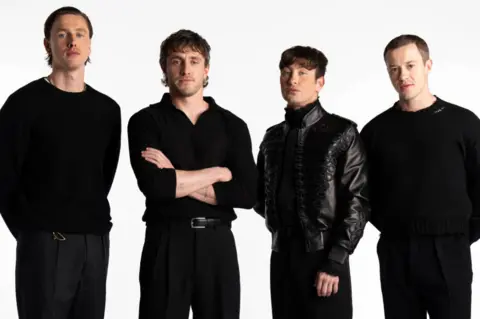 Sony
SonyThe Fab Four came together on stage this week for an all-star Beatles announcement that left some of the internet swooning.
No, Paul McCartney, John Lennon, George Harrison and Ringo Starr aren’t reuniting through AI for a joint album with Taylor Swift.
Instead, the 60s rock ‘n’ roll icons will be played by four leading heartthrobs of the moment: Paul Mescal (McCartney), Harris Dickinson (Lennon), Joseph Quinn (Harrison) and Barry Keoghan (Starr), in a big-screen quadrilogy directed by Sir Sam Mendes – all set for release in 2028.
Each actor fits the mould of “the internet’s boyfriends” – a term defined by Glamour magazine as “a famous or semi-famous male person whom your entire Twitter feed has a crush on at the same time”.
When Sir Sam walked out on stage with his “band” at Las Vegas’ CinemaCon on Tuesday, the message was clear.
If 1960s Beatlemania was defined by teenage girls fainting and screaming, the plan now is arguably to get Gen Z – in internet parlance – “screaming, crying, throwing up” from behind their phone screens in excitement.
“Each star brings their own brand of modern-day hysteria,” says the Evening Standard’s celebrity reporter Lisa McLoughlin, “the kind fuelled by social media virality and fan video edits”.
This is particularly true of Mescal, whose “popularity mirrors a smidge the frenzy the Beatles once sparked”.
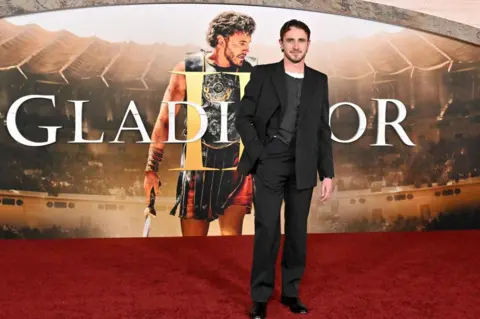 Getty Images
Getty ImagesAfter shooting to fame in 2020’s BBC adaptation of Normal People, the Irishman scored an Oscar nomination as a tormented father in Aftersun, before finding blockbuster status in Gladiator II – rising from indie heartbreaker to Hollywood heartthrob.
Similar is true of fellow Irishman Keoghan. Also Oscar-nominated for Banshees of Inisherin, he embraced rugged sex symbol status in last year’s cult hit Saltburn.
Dickinson and Quinn are earlier in their trajectory, but still burning bright – the former recently starring alongside Nicole Kidman in erotic thriller Babygirl and the latter turning heads in Netflix’s Stranger Things.
McLoughlin describes the casting as “logical and predictable” – a strategic move as the band look to secure their legacy with a new generation, while studios grapple with the ambition of luring streaming era, post-Covid, audiences back to the cinema not once, but four times in close proximity.
A day in the life?
The timing and scope of the project sums up the Beatles’ unique heritage as the best-selling band of all-time – the catalyst for shifting youth culture and the boundaries of pop.
It’s been 56 years since all four members last recorded together. Lennon was shot dead just over a decade later at 40, while Harrison died of cancer in 2001, aged 58. The two surviving Beatles, Sir Paul and Sir Ringo, are now into their 80s.
And yet, as the band’s only official biographer Hunter Davies told Radio 4’s Today programme on Wednesday: “The strange thing about the Beatles is that the longer we get from them, the bigger they become”.
Recent years have seen Sir Paul seemingly work to bookend the Beatles’ music – becoming Glastonbury’s oldest ever headliner at 80, before driving the 2023 release of Now and Then, a “final” Beatles track rebuilt from Lennon’s demo vocals. It became the band’s 18th UK number one single, over five decades from their last, and won a Grammy.
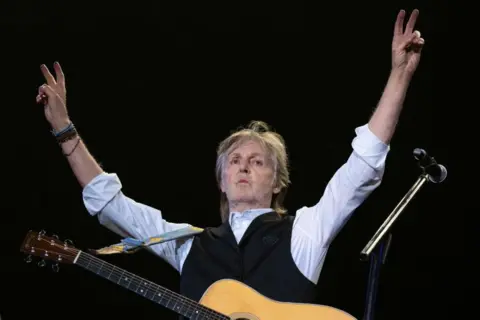 Getty Images
Getty ImagesThe forthcoming biopics appear to be a way of continuing this on the big screen.
Four years on from Peter Jackson’s sprawling Get Back docuseries, this is the first time that all four band members and their estates have granted full life story and music rights for a scripted film.
The casting reflects the distinct identities and histories of the members, each offering something different to lovelorn girls and copycat boys so intoxicated by Beatlemania.
McLoughlin feels the choices “make commercial sense” as the perfect foil for an audience now two generations removed from the original Beatlemania.
“They all have dedicated younger fan bases (many of whom may not be regular cinema-goers or deeply connected to the Beatles), acting credibility and experience leading or co-leading major productions”.
Each film will focus on an individual member of the band. “They intersect in different ways – sometimes overlapping, sometimes not,” Sir Sam explained.
“They’re four very different human beings. Perhaps this is a chance to understand them a little more deeply.”
‘Binge cinema’
The Barbenheimer phenomenon of summer 2023 highlighted the increasing influence online audience reactions hold on cultural currency.
It also turbocharged Hollywood’s acceptance of “event cinema” as a way to lure younger audiences. A generation that Warner Bros Discovery’s executive director Vera Chien previously told Forbes, already see the streaming-social media relationship as the norm.
Sir Sam’s four-film schedule plays into this. It’s aimed at creating what Sony executive Tom Rothman described as “the first bingeable theatrical experience”.
“Frankly, we need big cinematic events to get people out of the house,” Sir Sam said.
Films can now develop distinct digital identities through audience projection, as seen by the viral success of Saltburn.
The makers of the Beatles biopics are arguably betting on its cast of “internet boyfriends” pulling younger audiences – without the same nostalgic attachment to the Beatles – engaged on social media and, executives hope, looking up from phone screen to big screen.
The extent to which musical performances will feature is unknown.
But the Beatle biopics could capitalise on the booming money-spinning genre that’s found awards success over the past decade. .
It’s also proven fertile heartthrob ground, with the Beatles cast following Jacob Elordi and Austin Butler’s turns as Elvis, alongside Timothee Chalamet’s Oscar-nominated take as Bob Dylan in A Complete Unknown.
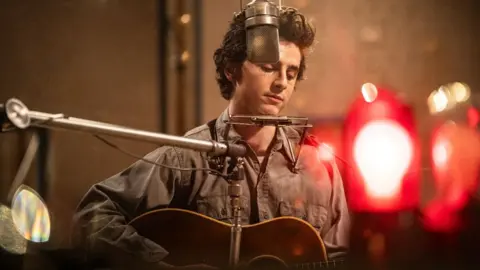 Searchlight
SearchlightStill, there are risks, says Dade Hayes, business writer at Deadline and co-author of Binge Times.
He says that whilst he commends Rothman’s “clever handle” and the cinephile in him values the biopics’ “bold statement about the value of cinemas and communal viewing,” market realities present cautionary signs.
First, the UK box office is yet to fully bounce back from the pandemic, whilst US takings are more than 20% below pre-Covid levels. “If people aren’t dying to return at regular intervals to cinemas,” says Hayes, “then you are holding an expensive set of assets that are hard to monetise”.
And a multi-release strategy relies on the “fuse being lit with the first instalment”, Hayes says.
He points to Kevin Costner’s Horizon films, originally envisioned as a multi-part theatrical franchise, only to flounder once the first instalment tanked, as an example of the dangers.
For McLoughlin, the three-year gap between the casting announcement and 2028 release date adds further risk, especially in the fast-moving online space where fanbases can shift.
Liverpool walking alone
But beyond industry dynamics there’s also a cast talking point much closer to home.
The Beatles biopics, celebrating four Scouse lads who conquered the world and put Liverpool on the map, will not feature any local talent in the lead roles.
As one Liverpudlian put it in a TikTok video liked over 200,000 times: “I love Mescal as much as the next gal but [the lack of representation] is breaking my heart”.
McLoughlin agrees, pointing out that James Corden last week urged the TV industry to be “bolder” and back ideas that “might scare you a little.” She feels film studios should do the same.
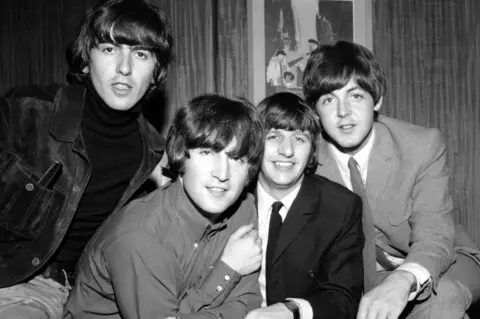
“The Beatles themselves were unknown until they weren’t,” she says. “This could have been a chance for a newcomer to have their own Beatles moment – rising from obscurity in real-time”.
And perhaps the biggest missed opportunity of all McLoughlin adds, is the failure to put Liverpudlian actors front and centre in a Beatles biopic. “The band is Liverpool’s greatest cultural export, yet the city’s deep talent pool was completely overlooked,” she adds.
Social media, meanwhile, is already awash with doubt over Keoghan’s ability to deliver a consistent Scouse accent, questioning his attempts in Saltburn.
Still, as Hunter Davies put it, the Beatles have long been more than just a local band. They keep growing.
Way back in 1966, Lennon infamously described them as bigger than Jesus. Over five decades on, the studio behind the four films – and perhaps cinema in general – is no doubt banking on a Beatlemania revival.
